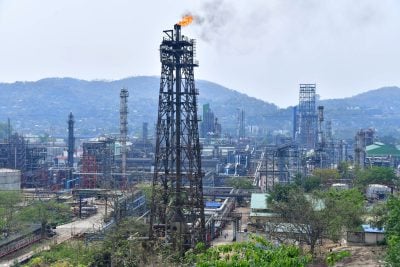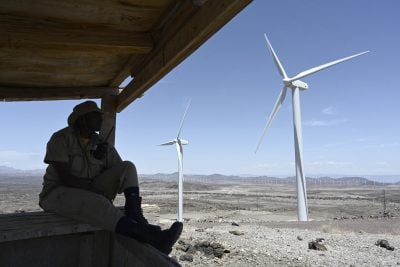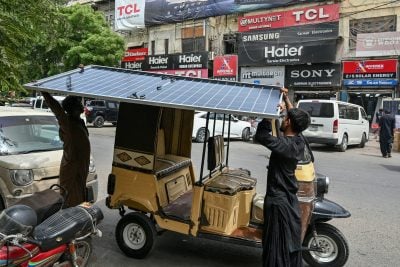A deal with one of China’s largest engineering firms will allow work to begin to expand the modernise Ghana’s oldest and second largest port at Takoradi. The port can no longer cope with the large spike in business volume it has seen over the last three years. The strain on the port will increase as it is expected to be the main conduit for oil from the western region.
The Ghana Ports and Harbours Authority (GPHA) has signed an agreement with the China Harbour Engineering Company (CHEC) for work to begin on the first phase of the $150m Takoradi Port Infrastructure Development Project.
The expansion project is being financed from GPHA’s share of the Chinese Development Bank (CBD) facility from the Chinese government. Richard Anamoo, director-general of GPHA, signed for the Authority, while Yang Tao, Country Manager of CHEC, initialled for the company.
CHEC, a world-renowned international contractor, a subsidiary of China Communications Construction Company Ltd (CCCC), has 40 overseas branches and offices with business activities covering more than 70 countries and areas. The company employs over 7,000 domestic and international staff and undertakes $10bn worth of projects.
The Port of Takoradi, Ghana’s second largest and oldest seaport, has always been a very important one. For decades, it has been the main conduit through which Ghana’s exports have been sent around the world. The main exports are commodities and solid minerals that account for the biggest exports in value terms, and which make up the mainstay of the Ghanaian economy in this era of global trade.
Now, the discovery of oil and gas offshore of Ghana’s Western Region has made the Port of Takoradi more important than ever before. It now stands to offer a lot more through the country’s new status as an oil producer with regard to revenue generation, employment and national strategic positioning. Which is why there is even more focus on the port by the government of Ghana itself, the Ghana Ports and Harbours Authority (GPHA), which owns and manages it, the country’s international development partners, and the international private trade and investment community, who have shown much concern in expanding the port.
Thus, as the sea port traditionally serving the cocoa, manganese and bauxite sectors, the obvious maritime hub for the emergent oil and gas industry, and the international gateway for the several industrial growth poles being planned for the resource-rich western half of the country, the Port of Takoradi holds immense potential. The Ports Authority and the government of Ghana have worked out detailed plans and strategies to exploit the opportunities that have presented themselves.
Currently, the export-oriented Port of Takoradi has seven berths – four multipurpose and one each specifically for manganese, bauxite and oil. Draughts range from nine to 10 metres. The port has a covered storage area of 140,000 square metres, 250,000 square metres of open storage space and container-holding capacity of 5,000 TEUs. The port also runs a fishing harbour at the neighbouring twin city of Sekondi.
Takoradi handled 53,041 TEUs in 2010 up 9% from 47,828 TEUs in 2009. Container imports totalled 24,127 TEUs and exports 28,914 TEUs. Vessel movements jumped 33.6% to 1,277 in 2010 from 956 the previous year. Ship turnaround time in 2010 averaged 2.1 days, down from 3.3 days in 2006. Total cargo traffic rose 19% to 4.01m tons in 2010, up from 3.37m tons in 2009. Imports totalled 1.72m tons and exports 2.29m tons in 2010 up from 1.26m tons and 2.11m tons respectively in 2009.
Traffic growth causes strains
The growth in traffic through Takoradi Port has been far greater than earlier anticipated, making it mandatory for a host of new infrastructural projects to be carried out over the next couple of years to meet the increment.
Of late, inadequate facilities and undue delays at the Takoradi Port have compelled oil service providers supporting operations on the Jubilee Field to redirect their vessels to neighbouring countries. Supply vessels at the port are still competing with cargo vessels for space. This is notwithstanding additional space provided by the Home Port of the Western Naval Command to take care of the increasing number of vessels.
Industry players are saying that the delays they encounter before they enter the port to take supplies cost them as much as $30,000. Container traffic at the Takoradi Port over the past three years continues to increase, without a corresponding increase in the facilities at the port.
The Takoradi Port currently has six berth spaces. One of them has been dedicated to vessels for the export of manganese and another has been leased to the lead operators among the Jubilee partners.
At the moment, the anchorage of the port, which used to be very free, is inundated with supply vessels and other vessels trying to enter the port. The deepest part of the port has been allocated for the discharge of bulk cargo and, therefore, other vessels have to wait at the anchorage at a great cost to shippers. The country, according to some shipping agents, is losing huge volumes of business and revenue to neighbouring countries and are therefore asking that immediate steps be taken to expand the facilities. Some of the agents said the port had reached its limit and that expansion work had to start immediately. The director of the Takoradi Port, Gordon Anim, acknowledged the problem, saying the current berth space at the port could not contain the flow of traffic. The port authority, he said, had realised that since the oil find, supply vessels that called at the Takoradi Port had increased without a corresponding increase in the berth space for them. Anim said to save the situation the port was doing everything possible to ensure that the supply vessels were given more attention to ensure quick turnaround time to support the offshore operations. He said the port was very much aware of the need for not only more berth space but also deeper berths to contain the flow of traffic.
The Western Regional Manager of the Ghana Shippers’ Authority (GSA), Monica Josiah, acknowledged that the port was busy and its shippers faced some challenges. She said the important thing to look at immediately was to ensure that services at the port did not delay in order not to add up to the congestion. Josiah advised members of the GSA to ensure that as a short-term measure their documentation should be up to date to reduce long delays of their vessels at the port.
Comprehensive deal
The deal with the Chinese engineering company for the first phase of the Takoradi Harbor Infrastructure Development project, worth $150m, will also cover the construction and extension of the breakwaters to reduce the intensity of wave action inshore, as a means of reducing coastal erosion.
The project would also see the construction of access roads to the port, a new bridge over the existing railway line and reclamation works. Construction of quay walls, demolition of worn-out structures such as the Sawn Timber and Cocoa Sheds that have outlived their usefulness and the pavement of some key areas within the port would also be carried out. It will also cater for the construction of a new security and fire service posts, new entry and exit gates, among other facilities.
At the signing ceremony of the project, which is expected to take off in October this year, Anamoo said upon completion the project would ease the traffic load at the port which had witnessed a surge in congestion in the last three years. “We expect the project will involve 40% local content to provide hundreds of job opportunities for both skilled and unskilled people in and around the Sekondi-Takoradi metropolis as well as suppliers of various materials and sub-contractors,” he said.
Anamoo said the authority was engaging the management of Ghana Railways Company (GRC) to lease part of their land in Sekondi for the construction of an Inland Container Depot (ICD) comparable to the Golden Jubilee Terminal in Tema. That, he said, would significantly decongest and improve container handling facilities and services at the Port of Takoradi. He said the authority had put before Parliament for consideration another loan agreement for the next phase of the project that would involve the construction of container and oil services terminals.
“We are of the expectation that there will be a significant reduction of traffic in Tema and also open up access to the two ports,” Anamoo reiterated.
Want to continue reading? Subscribe today.
You've read all your free articles for this month! Subscribe now to enjoy full access to our content.
Digital Monthly
£8.00 / month
Receive full unlimited access to our articles, opinions, podcasts and more.
Digital Yearly
£70.00 / year
Our best value offer - save £26 and gain access to all of our digital content for an entire year!

 Sign in with Google
Sign in with Google 




